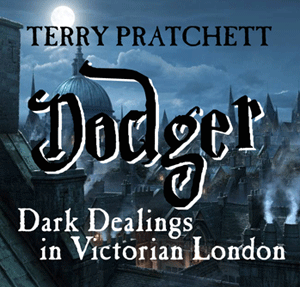Dodger is the latest and highly anticipated new book by Terry Pratchett; but unlike the brilliantly fantastical writing for which he has become renowned and known by, this offering reads more like a wry crime caper through the underbelly of Victorian London.
The story is told (in third person) mostly through the eyes of the young boy known as Dodger, having earned the name by moving quickly, which with the kind of life he leads is in fact necessary. Although a drastic change in direction for Pratchett, his typical sense of satire – and a tendency to never convey anything too seriously – are ever present throughout the story.
Clearly an homage to Charles Dickens from the start, Dickens – known as “Charlie” even makes an appearance as a supporting character, and in his interactions with Dodger, adding something of a “meta” quality to the whole thing. Even a sneaky “Can I have some more?” is rather knowingly put in there… Furthermore, despite Victorian London being notoriously unforgiving of those down on their luck, or otherwise fallen on bad fortune, Dodger is helped out by a few forgiving people; firstly the maid of the household he is part of for a short period of time, and then by Solomon Cohen, a devoutly Jewish and street-wise man with a habit of saying “mmm” constantly.
It is not long before Dodger focuses his attention on an unfortunate young woman, known only as “Simplicity”, who falls foul of some shady men and whom he takes it upon himself to help to save. Simplicity, however, remains a rather vague character, about whom we learn relatively little. She shows some resilience which lend her a slightly stronger presence as the story goes on but, unfortunately, her character is never really developed in a satisfactory way (perhaps in itself an echo to Dickens’ tendency to underwrite female characters in his writing?). Indeed Simplicity, near the end of the story, appears to be subsumed into another similar character known only as Serendipity, who appears to merely replace Simplicity.
However, this is otherwise a well-written and witty tale. Despite being typically “Pratchett-style”, in the way the characters are conveyed and how the story seems to unfold almost randomly, it is clear that Pratchett has done research into the reality of Victorian London, and indeed it reads in a sufficiently contemporary way that the story could almost be read as a comical take on what could very well have been written at the time.
Well worth a read whether or not you are a Terry Pratchett fan.
